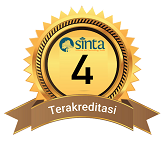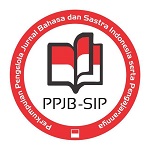Readiness Dosen dalam Mengintegrasikan Kecerdasan Buatan untuk Pengajaran Menulis Teks Akademik di Perguruan Tinggi
Abstract
. Penelitian ini bertujuan untuk menilai kesiapan dosen di perguruan tinggi polinema dalam mengintegrasikan Kecerdasan Buatan (AI) dalam pendidikan untuk penulisan tugas akademik dengan fokus pada persepsi, tantangan, dan kebutuhan pelatihan mereka. Metodologi kualitatif digunakan, dengan menggunakan Desain yang didasarkan pada prinsip-prinsip dasar Technology Acceptance Model (TAM) yang diusulkan oleh Davis (1989) Dale & Viethen (2021) dan Nazari dkk. (2021). Subjek penelitian yakni 10 dosen di dua Universitas Malang. panduan yang dikembangkan dan disempurnakan melalui tinjauan sejawat ahli dan studi percontohan ini mencakup sikap terhadap AI, manfaat dan tantangan yang dirasakan dari AI dalam pengajaran kemahiran diri dalam menggunakan AI, dan niat perilaku terkait penggunaannya. Hasilnya menunjukkan tingkat kesiapan dosen yang berbeda-beda, yang dipengaruhi oleh latar belakang pemahaman teknologi, dan kekhawatiran akan privasi dan keamanan data. Meskipun ada rasa optimisme secara umum tentang potensi AI, tantangan signifikan terkait akses sumber daya yang terbatas dan pengembangan profesional yang tidak memadai telah diidentifikasi. Hasil penelitian ini menekankan perlunya inisiatif kebijakan yang ditargetkan dan program pelatihan untuk meningkatkan kesiapan dosen dalam mengadopsi AI. Wawasan dari penelitian ini berkontribusi dalam memahami fasilitator dan hambatan integrasi AI dalam pendidikan, menyoroti peran penting kesiapan dosen dalam pemanfaatan AI yang efektif dalam konteks pendidikan.
KATA KUNCI: Kesiapan AI, Adopsi AI, kecerdasan buatan, penulisan teks akademik, perguruan tinggi
Keywords
Full Text:
PDF (Bahasa Indonesia)References
Agbo, Nduibisi, M. C., & Gwoza, M. L. (2022). Awareness, willingness and readiness of pre-service teachers ……. Ajstme, 8(1), 25–31. https://www.ajstme.com.ng
Ali, A. (2023). Assessing Artificial intelligence readiness of faculty in higher education : Comparative case study of Egypt . Thesis[American University in Cairo].
Alnasib, B. N. M. (2023). Factors affecting faculty members’ readiness to integrate artificial intelligence into their teaching practices: A Study from the Saudi Higher Education Context. International Journal of Learning, Teaching and Educational Research, 22(8), 465–491. https://doi.org/10.26803/ijlter.22.8.24
Aruleba, K., Jere, N., & Matarirano, O. (2022). Technology adoption readiness in disadvantaged universities during covid-19 pandemic in South Africa. International Journal of Higher Education, 11(2), 172. https://doi.org/10.5430/ijhe.v11n2p172
Ayanwale, M. A., Sanusi, I. T., Adelana, O. P., Aruleba, K. D., & Oyelere, S. S. (2022). Teachers’ readiness and intention to teach artificial intelligence in schools. Computers and Education: Artificial Intelligence, 3(June), 100099. https://doi.org/10.1016/j.caeai.2022.100099
Chai, C. S., Lin, P. Y., Jong, M. S. Y., Dai, Y., Chiu, T. K. F., & Huang, B. (2020). Factors influencing students’ behavioral intention to continue artificial intelligence learning. In Proceedings - 2020 International Symposium on Educational Technology, ISET 2020 (pp. 147–150). https://doi.org/10.1109/ISET49818.2020.00040
Chai, C. S., Wang, X., & Xu, C. (2020). An extended theory of planned behavior for the modelling of chinese secondary school students’ intention to learn artificial intelligence. Mathematics, 8(11), 1–18. https://doi.org/10.3390/math8112089
Gunawan, H., Sinaga, B. L., & Sigit Purnomo, W. P. (2019). Assessment of the readiness of micro, small and medium enterprises in using E-money using the unified theory of acceptance and use of technology (UTAUT) method. In Procedia Computer Science (Vol. 161). Procedia Computer Science. https://doi.org/10.1016/j.procs.2019.11.129
Hafez, S. M. (2013). Factors affecting elementary and junior high school teachers’.
Khamis, R. (2023). Measuring citizens’ acceptance and usage of e-government services: applying the technology acceptance model (TAM) in Egypt (pp. 1–90). https://fount.aucegypt.edu/etds/1969
Kiryakova, G., & Angelova, N. (2023). ChatGPT—a challenging tool for the university professors in their teaching practice [ChatGPT: Una Herramienta Desafiante para los Profesores Universitarios en su Práctica Docente]. Education Sciences, 13(1056), 1–19. https://doi.org/10.3390/ educsci13101056
Lee, I., & Perret, B. (2022). Preparing high school teachers to integrate ai methods into stem classrooms. In Proceedings of the 36th AAAI Conference on Artificial Intelligence, AAAI 2022 (Vol. 36). Association for the Advancement of Artificial Intelligence. https://doi.org/10.1609/aaai.v36i11.21557
Li, H., Gobert, J., & Dickler, R. (2019). Evaluating the transfer of scaffolded inquiry: What sticks and does it last? Lecture Notes in Computer Science (Including Subseries Lecture Notes in Artificial Intelligence and Lecture Notes in Bioinformatics), 11626 LNAI, 163–168. https://doi.org/10.1007/978-3-030-23207-8_31
Lin, P., & Brummelen, J. Van. (2021). Engaging teachers to co-design integrated ai curriculum for k-12 classrooms. Conference on Human Factors in Computing Systems - Proceedings, 1–12. https://doi.org/10.1145/3411764.3445377
Lin, X. F., Chen, L., Chan, K. K., Peng, S., Chen, X., Xie, S., Liu, J., & Hu, Q. (2022). Teachers’ Perceptions of teaching sustainable artificial intelligence: A design frame perspective. Sustainability (Switzerland), 14(13), 7811. https://doi.org/10.3390/su14137811
Moorhouse, B. L. (2024). Beginning and first-year language teachers’ readiness for the generative AI age. Computers and Education: Artificial Intelligence, 6(November 2023), 100201. https://doi.org/10.1016/j.caeai.2024.100201
Ng, D. T. K., Leung, J. K. L., Chu, S. K. W., & Qiao, M. S. (2021). Conceptualizing AI literacy: An exploratory review. Computers and Education: Artificial Intelligence, 2, 100041. https://doi.org/10.1016/j.caeai.2021.100041
Nikolopoulou, K., Gialamas, V., Lavidas, K., & Komis, V. (2021). Teachers’ readiness to adopt mobile learning in classrooms: A study in Greece. Technology, Knowledge and Learning, 26(1), 53–77. https://doi.org/10.1007/s10758-020-09453-7
Omenka, O. S., Reuben, B., & Usman, L. A. (2024). A Review of artificial intelligence (ai) readiness in higher education institutions: A case study of Northern States of Nigeria BY. Global Journal of Engineering and Technology, July. https://gsarpublishers.com/journal-gjet-home/
Sanusi, I. T., Olaleye, S. A., Oyelere, S. S., & Dixon, R. A. (2022). Investigating learners’ competencies for artificial intelligence education in an African K-12 setting. Computers and Education Open, 3, 100083. https://doi.org/10.1016/j.caeo.2022.100083
Shofiah, N., Putera, Z. F., & Solichah, N. (2023). Challenges and opportunities in the use of artificial intelligence in education for academic writing: A scoping review. Advances in Social Science, Education and Humanities Research, 808, 174–193. https://doi.org/10.2991/978-2-38476-188-3_20
Shofiah, N., Ridho, A., & Putera, Z. F. (2023). Menyelidiki implikasi etis dari pengintegrasian generator teks kecerdasan buatan dalam penulisan akademik. Prosiding Kongres Bahasa Indonesia XII, 2–2.
Soetan, A. K., & Coker, A. D. (2018). University lecturers’ readiness and motivation in utilizing online technologies for instructional delivery in Kwara State, Nigeria. World Journal on Educational Technology: Current Issues, 10(4), 165–181. https://doi.org/10.18844/wjet.v10i4.4080
Trotsko, A. V., Rybalko, L. S., Kіrіlenko, O. G., & Trush, H. O. (2019). Професійне Самовдосконалення Викладачів В Умовах Упровадження Дистанційного Навчання В Закладах Вищої Освіти. Information Technologies and Learning Tools, 72(4), 258–272. https://doi.org/10.33407/itlt.v72i4.3088
VanLehn, K., Banerjee, C., Milner, F., & Wetzel, J. (2020). Teaching algebraic model construction: A Tutoring system, lessons learned and an evaluation. International Journal of Artificial Intelligence in Education, 30(3), 459–480. https://doi.org/10.1007/s40593-020-00205-3
Wang, X., Li, L., Tan, S. C., Yang, L., & Lei, J. (2023). Preparing for AI-enhanced education: Conceptualizing and empirically examining teachers’ AI readiness. Computers in Human Behavior, 146. https://doi.org/10.1016/j.chb.2023.107798
Yundayani, A., Kardijan, D., & Apriliani, R. D. (2020). The impact of pbworks application on vocational students’ collaborative writing skill. Jurnal Cakrawala Pendidikan, 39(3), 694–704. https://doi.org/10.21831/cp.v39i3.25077
Zawacki-Richter, O., Marín, V. I., Bond, M., & Gouverneur, F. (2019). Systematic review of research on artificial intelligence applications in higher education – where are the educators? International Journal of Educational Technology in Higher Education, 16(1). https://doi.org/10.1186/S41239-019-0171-0
DOI: https://doi.org/10.21107/metalingua.v9i2.27713
Refbacks
- There are currently no refbacks.
Copyright (c) 2024 Zulmy Faqihuddin Putera, Nurul Shofiah, Rizki Putri Ramadhani, Ahsani Maulidina, Peni Puspitasari

This work is licensed under a Creative Commons Attribution-ShareAlike 4.0 International License.
Jurnal Pendidikan Bahasa dan Sastra Indonesia Metalingua by Universitas Trunojoyo Madura is licensed under a Creative Commons Attribution-ShareAlike 4.0 International License.















